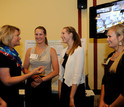News Release 15-129
Competition opens for second annual Community College Innovation Challenge
Students invited to compete for cash prizes, professional coaching by devising innovative solutions to challenges at nexus of food, energy and water

Community College Innovation Challenge, #CCIChallenge, will accept submissions now until Feb. 15.
October 15, 2015
This material is available primarily for archival purposes. Telephone numbers or other contact information may be out of date; please see current contact information at media contacts.
Today, the National Science Foundation (NSF) in partnership with the American Association of Community Colleges (AACC) opens up competition for the second annual Community College Innovation Challenge.
This contest calls on students enrolled in community colleges to propose innovative science, technology, engineering and mathematics (STEM)-based solutions to perplexing, real-world problems. This year, solutions are sought to take on challenges at the nexus of food, energy and water systems.
Researchers have called this nexus a "trilemma," one that requires significant action to address either by institutional and behavioral means, or through technological and infrastructure advancements.
NSF has invested nearly $75 million in research in this area with the cross-agency initiative Innovations at the Nexus of Food, Energy and Water Systems, INFEWS. Students who participate in the challenge will contribute to this national effort, as well as benefit from cash prizes and professional development opportunities.
"Based on the engaged, enthusiastic CCIC participants last year, we know that community college students are up to this year's challenge," said Susan Singer, director of NSF's Division of Undergraduate Education. "We look forward to their solutions and to coaching them to be stronger players in STEM fields."
Community colleges play an important part in developing America's workforce in technical fields. They do so in part by involving underrepresented groups in science and recognizing the importance of mentoring students for STEM careers. Many graduates became highly valued technicians in a variety of fields, supporting industry's need for an educated and technologically up-to-date workforce.
NSF and AACC invite teams of community college students to identify key problems at the nexus of food, energy and water systems, propose innovative solutions, and submit their ideas from Oct. 15, 2015, to Feb. 15, 2016, via NSF's CCIC website.
Each team must consist of three to five students currently enrolled and in good standing at a two-year associate-degree granting institution, a faculty mentor, and a community or industry partner.
Up to 10 teams will be selected as finalists and invited to participate in an Innovation Boot Camp on June 20-23, 2016.
This professional development workshop on innovation and entrepreneurship, featuring experts in a variety of related fields, is designed to hone skills applicable to commercializing ideas, using technology for social applications, communicating with stakeholders and creating business strategies.
Final-round judging will take place in person on the last day of Innovation Boot Camp. Cash awards will be distributed to top teams. Interested students may visit the challenge website for the full eligibility criteria, entry guidelines, timeline and prize information.
This challenge enables students to discover and demonstrate their ingenuity to use science to make a difference in the world and to transfer knowledge into action. It also helps to incorporate research into community colleges' traditional teaching mission.
Follow the @NSF #CCIChallenge on Twitter and Facebook.
-NSF-
-
Oklahoma Congressman Markwayne Mullin meets with students from Tulsa Community College on the Hill.
Credit and Larger Version -
Wyoming Rep. Lummis meets at 2015 Congressional Reception with CC innovators from Sheridan College.
Credit and Larger Version
Media Contacts
Lisa-Joy Zgorski, NSF, (703) 292-8311, email: lisajoy@nsf.gov
Program Contacts
Susan R. Singer, NSF, (703) 292-8760, email: srsinger@nsf.gov
Kimberly Nelson, NSF, (703) 292-5052, email: knelson@nsf.gov
Related Websites
CCIC Website: http://www.nsf.gov/CCchallenge/
American Association of Community Colleges Website: http://www.aacc.nche.edu
Red Rocks and Ivy Tech teams place first and second in NSF CCIC: http://www.nsf.gov/news/news_summ.jsp?cntn_id=135517
The U.S. National Science Foundation propels the nation forward by advancing fundamental research in all fields of science and engineering. NSF supports research and people by providing facilities, instruments and funding to support their ingenuity and sustain the U.S. as a global leader in research and innovation. With a fiscal year 2023 budget of $9.5 billion, NSF funds reach all 50 states through grants to nearly 2,000 colleges, universities and institutions. Each year, NSF receives more than 40,000 competitive proposals and makes about 11,000 new awards. Those awards include support for cooperative research with industry, Arctic and Antarctic research and operations, and U.S. participation in international scientific efforts.
Connect with us online
NSF website: nsf.gov
NSF News: nsf.gov/news
For News Media: nsf.gov/news/newsroom
Statistics: nsf.gov/statistics/
Awards database: nsf.gov/awardsearch/
Follow us on social
Twitter: twitter.com/NSF
Facebook: facebook.com/US.NSF
Instagram: instagram.com/nsfgov




